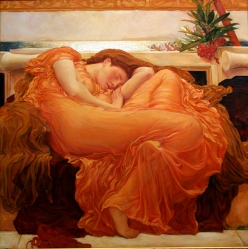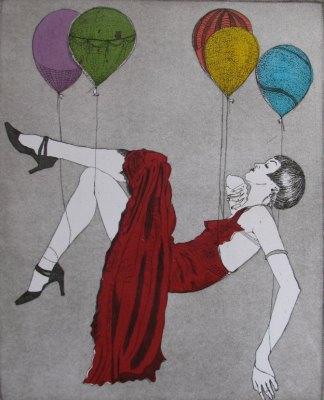As a person with narcolepsy and an avid reader, I was undoubtedly thrilled to discover Wide Awake and Dreaming recently. After thoroughly enjoying this book (see my review here), I decided to try contacting Julie Flygare for an interview — and she agreed! Without further ado, here is a quick description of her awesome book, and an interview with the author!
_________________________________________________________________
About the Book: Wide Awake and Dreaming
Julie Flygare was on an ambitious path to success, entering law school at age 22, when narcolepsy destroyed the neurological boundaries between dreaming and reality in her brain. She faced terrifying hallucinations, paralysis and excruciating sleepiness aspects of dream sleep taking place while wide awake.
Yet, narcolepsy was a wake-up call for Julie. Her illness propelled her onto a journey she never imagined from lying paralyzed on her apartment floor to dancing euphorically at a nightclub; from the classrooms of Harvard Medical School to the start line of the Boston Marathon.
Wide Awake and Dreaming is a revealing first-hand account of dreams gone wrong with narcolepsy. It s the brave story of one woman trampling over barriers and finding light in the darkest of circumstances.
_________________________________________________________________
Interview with Julie Flygare
What was the best part about being diagnosed with narcolepsy?
What was the worst part?
Being diagnosed with narcolepsy was validating because I finally had names for the mysterious problems which I had ignored and repressed for years. Diagnosis was also overwhelming because I didn’t know what it meant for my future. (I made a short video describing this experience here: http://youtu.be/AINFEYLACWU)
After going through ups and downs with medication, have you settled on a regimen that works well for you? How effective is it?
I have found a good regimen that works well for me – there are no cures or quick fixes but my treatment includes taking medication twice a day and twice a night, napping once or twice a day and scheduling my eating carefully to maximize wakefulness. It’s a lot to coordinate, but it’s second nature to me now and not nearly as challenging as in the beginning.
You’ve experienced some bouts of cataplexy that far exceed my experiences (I’ll fall down, but have yet to lose control for more than 30 seconds, tops). Are they all so extreme, or do you still have little bouts too (like just weak knees from laughter)?
I have many small cataplexy attacks still – usually late at night or while socializing. With medication, my longer attacks are less frequent and the smaller attacks are manageable.
After you started on Xyrem, it was clear that you experienced some pretty frustrating mood swings, and I found myself nodding along with you while reading those parts. Did you ever suspect that the Xyrem was affecting your mood? (I ask because I recently went off of Xyrem and noticed a major shift in my personality. Back to the “real,” passionate me; not the moody, irritable person I had become.)
I’ve found that my daytime stimulants can affect my mood – making me irritable, gloomy and anxious. When I started Xyrem, I was fearful that it might have been affecting my mood, but in retrospect, I think I was picking up on vibes that my boyfriend was distancing himself from me. I’ve never had a problem with my Xyrem and mood swings since.
As a person with lots of drive and ambition, it’s clear that you were very hard on yourself during the years described in your book. Looking back, would you have changed anything? (I’m thinking of situations like the Halloween party where you felt guilty for wanting to sleep away your pounding headache instead of entertaining your friends.)
I wouldn’t change anything because it was the process I had to go through. I’m just so glad that I eventually found more positive ways of coping eventually. Silencing my inner-critic has been a challenge but I’ve gotten better at it with time.
Throughout the book you described having trouble staying awake while studying. Did you have similar problems while writing this book, or is writing easier?
Writing the first draft was exhilarated, but editing and proof-reading was challenging with narcolepsy. I would enter a sleep haze while working and eventually fall asleep, but when I’d wake up, I couldn’t remember how far I’d gotten in my editing before my consciousness fizzled, so I usually had to go back 5 or 10 pages to resume editing. It made for a long process to ensure there were no errors in the final draft.
The cover for your book is absolutely fantastic and gorgeous and I love it so much! Did you have any say in the creation of your cover? How do you feel about it?
I’m so glad you like my cover! It’s actually a really great story – I wrote about it here: http://julieflygare.com/unveiling-wide-awake-dreamings-book-cover/
Running is obviously an important part of your life. How much has narcolepsy changed your routine, or thoughts about exercise in general?
I no longer care about being the fastest or best at any sport. I just take my time exercising and enjoy being outdoors and celebrating my healthier moments. I never would have considered walk/running before narcolepsy, but now I’m convinced it’s the best way to run a marathon – with or without narcolepsy.
What advice would you give to someone struggling with mysterious bodily issues, like you did?
Trust your gut instinct and speak up to doctors. Only you know what’s you’re experiencing. Keep on fighting til you get answers.
Living with narcolepsy can be discouraging, as we both know. What’s the best way you’ve found to stay positive and energetic about life?
I try to see my symptoms as reminders that my healthier moments are special and worth celebrating. It’s the best way I’ve found to move past my negativity. This coping mechanism didn’t come naturally, but was part of the transformation I discuss in my book.
While reading your book, I noticed that many people in your life were quite supportive (your father, roommates, a couple friends, even the dean of your school!). Do you have any advice for people who might not have as strong of a support network?
I’ve had unsupportive people in my life who don’t “get it,” I meant to discuss this more in the book but didn’t quite bring it out as much as I’d hoped to, besides touching on it with my boyfriend Taylor. For unsupportive people my advise is two-fold: first – you can invite this individual to a sleep doctor’s appointment, support group, or narcolepsy network conference… You can also suggest my book now (shameless plug!) ;-) But ultimately, you may not be able to get through to some individuals. This is very unfortunate. My second piece of advice: be patient, you will find supportive people to add to your life.
With time, I’ve met people who see my narcolepsy as something “cool” and courageous about me. I could never predict who will think this – but surprisingly, it comes so easily to some people to support me and “get it.” I cherish these friendships and wonder why I was banging my head against the wall trying to get the other individuals to “get it” for so long. Some of those original non-supportive people are still in my life by circumstance, but it no longer bugs me nearly as much because I’ve lowered my expectations and don’t expect their support in this area… I hold tightly to those friendships who “get it” so effortlessly.
Since finishing your book, what’s your next move? Any plans to go back and take the Bar exam? Are you planning to further pursue art history? Run in the Olympics?
I’ve done some exciting health communications and health policy work. I hope to continue advocating for patients and writing more books eventually.
Quickfire Round!

Flaming June – a pre-Raphaelite painting by Frederic, Lord Leighton
Speaking of art history, what’s your favorite historical period, art-wise?
19th century English – the PreRaphaelites fascinate me!
Popcorn or ice cream?
Ice cream – defintely!
Mountains or beach?
Beach
Funny movie or scary movie?
Funny movie – no scary movies for me, my hypnagogic hallucinations are enough scary entertainment for me.
Wine, beer, or cocktails?
I don’t get to drink often with my narcolepsy medication, but I like red wine.
_________________________________________________________________
About the Author: Julie Flygare
Julie Flygare received her B.A. from Brown University and her J.D. from Boston College Law School. Diagnosed with narcolepsy in 2007, Julie has become a national narcolepsy spokesperson and advocate. Her dreams are studied in Harvard Medical School’s curriculum. Her story has been featured by Marie Claire Magazine, ABC News, NBC News, Sirius XM Radio and Psychology Today.
website: julieflygare.com
twitter: @RemRunner
facebook: JulieFlygareAuthor_________________________________________________________________
